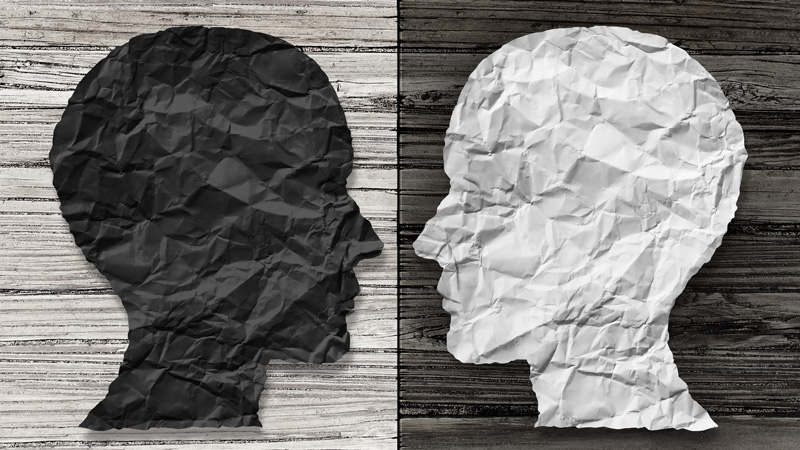Home > Mental Health > Depression > Bipolar Disorder
BIPOLAR DISORDER IN TEENS
Bipolar Disorder used to be known as manic depression. It is a mental health disorder that is characterized by extreme mood swings.

General Information
Teenagers who suffer from bipolar disorder will experience intense emotional highs, known as mania or hypomania, and extreme lows, known as depression. These episodes can occur frequently over the span of a year, or infrequently. The drastic shift in mood can affect many aspects of a teen’s life. Bipolar disorder has the propensity to affect a person’s energy levels, activity, social network, financial situation, sleep, behaviors, judgement and family life. When a person experiences the highs of bipolar disorder, or mania, he or she will most likely experience a feeling of euphoria. When a younger person is experiencing the lows of bipolar disorder, he or she will most likely become sad, depressed, and or experience feelings of hopelessness. Bipolar disorder can happen at any age, but most commonly it is diagnosed in individuals under the age of twenty, in their teenage years.
Signs & Symptoms
As previously stated, there are two distinct extremes of this condition. Therefore, there are two sets of symptoms that are commonly exhibited in teens who suffer from bipolar disorder. Every person is different and he or she may display different combinations of the following symptoms. Bipolar disorder is diagnosed when a person experiences three or more symptoms in the mania and hypomania category and five or more symptoms from the major depressive category. Symptoms can also change throughout one’s lifetime. The following include many common symptoms that can be experienced during a mania or hypomania state:
- Increased energy
- Euphoria
- Agitation
- Easily distractible
- Decreased need for sleep
- Excessive talkativeness
- Lack of judgement
- Atypically upbeat
- Difficulties at work
- Shift in social activities
- Psychosis
- Relationship challenges
The following list of symptoms includes those that can occur when an adolescent is experiencing a major depressive episode:
- Inability to experience pleasure or loss of interest in social activities
- Irritability
- Crying spells (frequent and random crying throughout the day)
- Depressed mood
- Feelings of hopelessness
- Loss of energy
- Shift in sleeping habits (either sleeping too much or experiencing insomnia)
- Slowed behavior
- Restlessness
- Feelings of excessive guilt
- Inability to think clearly
- Indecisiveness
- Suicidal ideations
- Lack of energy
- Shift in appetite resulting in drastic weight loss or weight gain
Every teenager is different and will experience a different set of symptoms when it comes to both the mania stage and the depressive stage of bipolar disorder. It has been noted that bipolar disorder is specifically challenging to diagnose in children and teens, as it is difficult for clinicians to distinguish between the normal ups and downs that exist in children and teenager’s lives. The most common sign of bipolar disorder in children and teens is extreme mood swings that are different from one’s typical mood swings. During the adolescent stage of life, a significant amount of natural development is continuously occurring, which is always considered by a mental health professional when diagnosing any teen with a mental health condition.

Treatment
Bipolar disorder is a mental health condition that is lifelong. This does not mean that the person is destined to struggle their entire lives, but it’s important that the family seek treatment to learn how to manage the condition. There are many different treatment options for a younger person suffering from bipolar disorder that will help him or her learn proper coping mechanisms to live with the condition. Most commonly bipolar disorder is treated under the care of one or more medical professionals that specialize in treating mental health conditions. Some of the most frequently practiced treatment options include any combination of the following: medications, outpatient treatment, residential treatment, hospitalization, psychotherapy, and in some cases, behavioral oriented treatment, as it is not uncommon for teenagers who suffer from bipolar disorder to also struggle with substance abuse or other negative coping skills (such as self-harm, disordered eating, isolating, etc.). The most important thing to remember is that, nowadays, there are many options for young people who have bipolar disorder to obtain treatment and lead a healthy life.
Further Information
Every family in need of mental health treatment must select a program that will best suit the needs of their family. When one member of a family struggles, it impacts everyone in the family unit. In order to maximize the benefits of treatment we work closely with the entire family to ensure that everyone is receiving the support they need through these difficult times.
Seeking help is never easy, but you are not alone! If you or someone you know is in need of mental health treatment, we strongly encourage you to reach out for help as quickly as possible. It is not uncommon for many mental health difficulties to impact a person’s life, long term. Seeking support at the beginning of one’s journey can put the individual in the best position to learn how to manage themselves in a healthy way so they can go on to live happy and fulfilling lives.
Our admissions team can be reached 24/7 at info@pacificrtc.com or call: Phone Number,(800) 531-5769
We are available to answer any questions you may have regarding mental health treatment and our residential program, anytime. Contact us today using the form to the right.

